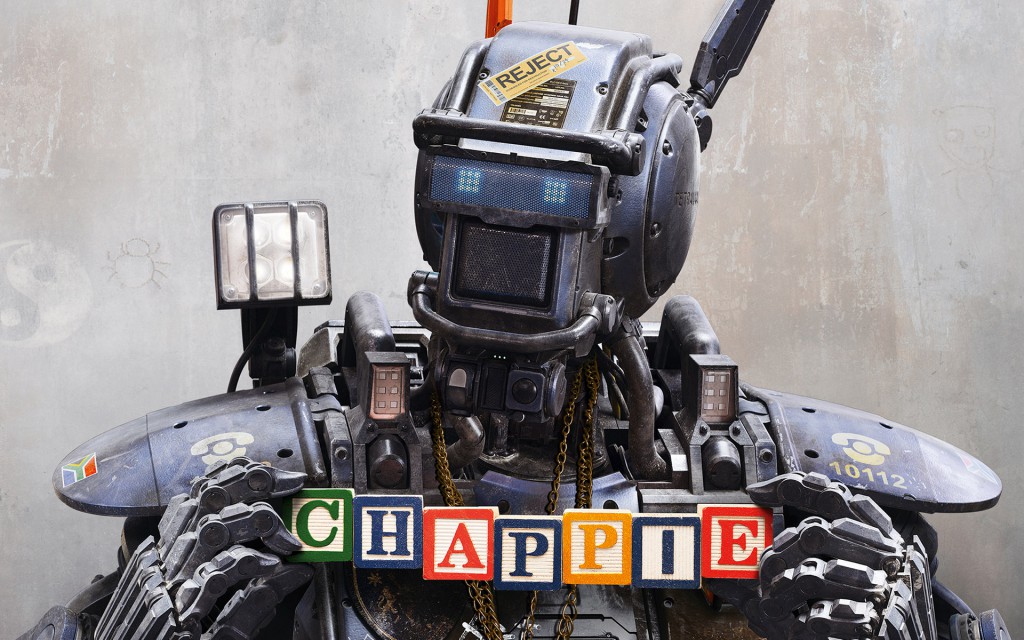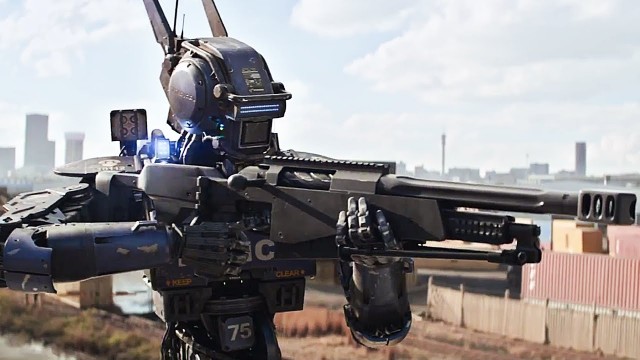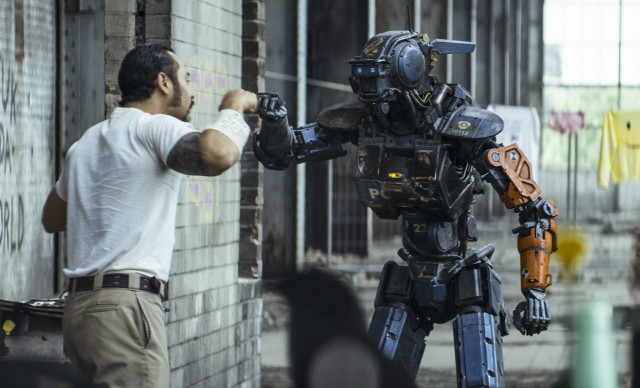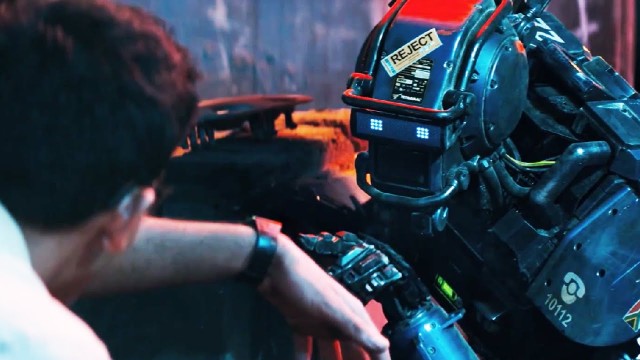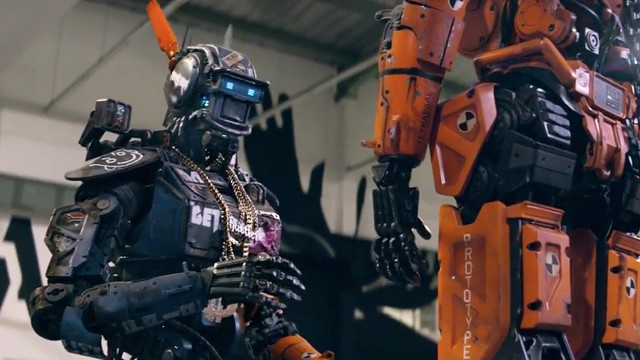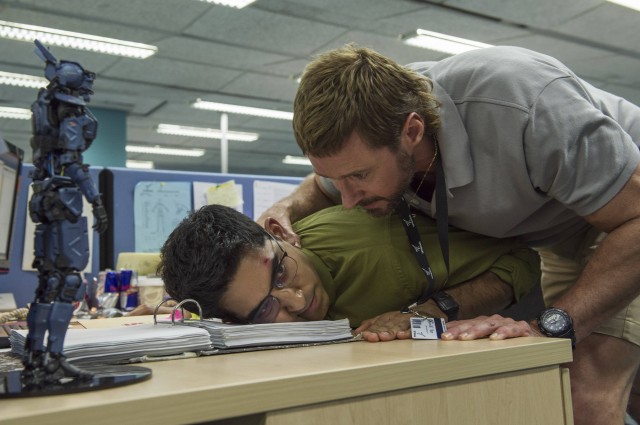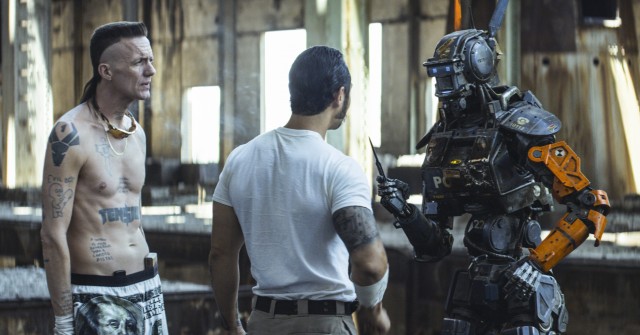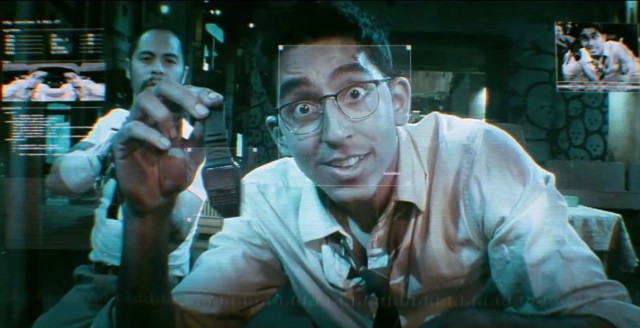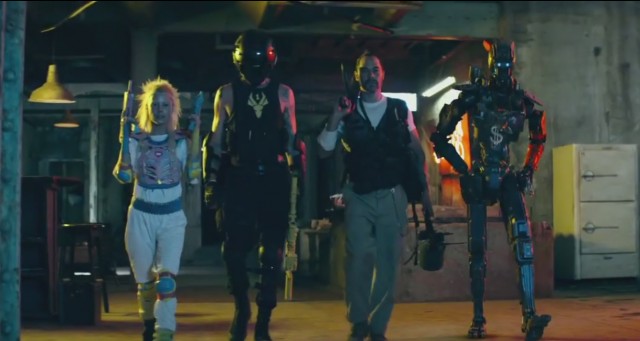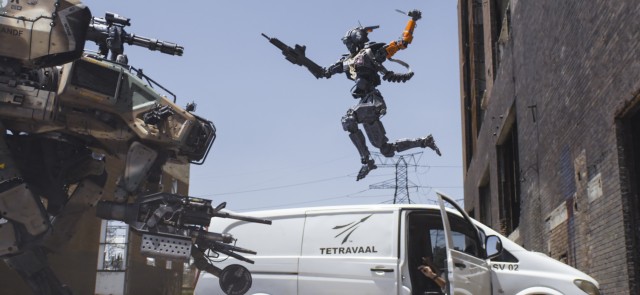South African director, Neill Blomkamp has made a name for himself with provocative, dramatic and original science-fiction movies. Once the chosen man to helm the aborted feature film adaptation of Halo, Blomkamp instead carved out a niche of making timely, creative sci-fi films that didn’t rely on an existing license, a rarity in modern Hollywood. The first and biggest result of Blomkamp’s vision was, naturally, 2009 hit, District 9, which was followed by the more Hollywood-friendly Elysium in 2013.
After Elysium however, Blomkamp has gone back to basics, taking another short film that he made over a decade ago, Tetra Vaal, and extending it to feature length, with the help of Sony Pictures. The result is Chappie, a movie that tries to marry the Hollywood production value of Elysium with the allegorical, grounded sci-fi stylings of District 9. The result is a movie that undeniably falls short of Blomkamp’s original breakout hit from 2009, but still proves to be a reasonably entertaining offering from the director, albeit arguably the most simple-minded of his three feature films for sure.
Nonetheless, Chappie feels timely, given all of the debates around the aggressive development of artificial intelligence in our modern life. Chappie doesn’t answer most of the questions it raises, particularly since the movie is far more interested in being an action blockbuster than a true allegory, but that means that those coming for a popcorn flick will be entertained, even if the intellectuals in the audience might feel let down.
Still, Chappie is worth the trip for sci-fi film fans, even if its separate elements don’t come together as seamlessly as hoped.
The title character of Chappie is no doubt the movie’s biggest draw. Chappie himself is voiced by regular Blomkamp collaborator, Sharlto Copley, in what’s by far his most endearing performance to date. It’s easy to forget that Chappie is a machine, which speaks volumes about how adorable and loveable the character is. He’s not just an effect. He feels like an actual character.
In fact, Copley completely steals the show as Chappie, who appears to create a talent vacuum that draws all attention to him in any scene he’s in. Despite a solid supporting cast that includes Dev Patel, Sigourney Weaver and Hugh Jackman, this really is Chappie’s movie, which is perhaps fitting, since every story element seems to come back to the robot. Yes, it’s another one of those ironic movie cases where the most emotional and sympathetic character in the entire piece is the robot.
It’s surprising how little screentime both Patel and Weaver get as well. Jackman gets a little more time in the spotlight, chewing scenery as the artificial intelligence alarmist/careerist douche bag who wants the automated police force of the movie pushed aside for his own creation, which looks startingly reminiscent of an extra scary-looking ED-209 from Robocop. No wonder the robotics company didn’t fund that beast!
Anyway, as much as the movie attempts to create a trinity of viewpoints on artificial intelligence, between the hopeful Patel, the contrasting Jackman, and the netural Weaver, it’s a debate that the movie only touches on a very fundamental, perfunctory level. Despite the pedigree of the actors, none of these lead characters are terribly deep, saying what so many narratives with their positions have all said in other media already. Chappie ultimately doesn’t raise any new questions with its personalities, nor does it provide any real answers, despite its initial claim of having insight into this whole A.I. thing.
A bit more noteworthy is the presence of Chappie’s mentors, Ninja, Yolandi and Yankie, the former two of which are played by Ninja and Yo-Landi Visser of South African rap/rave group, Die Antwoord, while Yankie is played by another returning Blomkamp veteran from Elysium, Jose Pablo Cantillo. These three are criminals who bring up Chappie to be a gangbanger, which has a bit of goofy charm at times, even though it’s meant to ask the question of what happens when gifted A.I. clearly ends up in the wrong hands. Ninja seems to be especially aggressive with grooming Chappie for a heist that will help get the group out of trouble with a particularly violent crime lord, while Yolandi and Yankie take more soft-handed approaches, and respect the fact that, while he learns rapidly, Chappie is still a boy at heart, who must develop over time for good or for ill, as young humans do.
Again, it’s ironic that it’s the humans that feel like the calculated machines, while the robot is the one giving the heart to everything. Chappie is the only character that feels like he’s more than circuits and wires, at least within the script, and is the only personality with any rounded, organic development. That’s likely why Chappie himself is the one element of the movie that gives it any real depth.
The story of Chappie begins with another interesting near-future from the mind of Neill Blomkamp. In South Africa, some years ahead, an automated robot police force has been built to quell rising crime numbers in the nation. The mastermind behind this police force is Deon Wilson, Dev Patel’s character, who works on developing his A.I. program at home as a hobby, without the approval of the company that’s contracted him, Tetravaal, a reference to the short film that inspired Chappie.
When Deon believes that he’s found a program that can act as true sentient artificial intelligence, he salvages an ‘unlucky’ robot police scout scheduled to be scrapped, and inputs the program into him. When Deon is hijacked by a group of criminals looking to steal a police robot for a heist however, they seize the robot for themselves, whom they christen, “Chappie.” As Chappie grows and develops as Deon predicted, most of the criminals have second thoughts about using him for evil, as the leader nonetheless pushes Chappie into a life of crime, while Deon’s competitor at Tetravaal, Vince Moore, conspires to use the truth of Chappie to put an end to Deon’s scout program, installing his human-controlled machines instead.
The premise of Chappie is quite sound, even if it treads some familiar territory for stories questioning a future driven by robotics and artificial intelligence. The execution of said premise however is a bit more uneven. Again, Chappie himself, and his journey, is the big draw of the movie. Everything else however just feels like a byproduct of that, with nothing else in the interesting lore feeling like it has real legs of its own, past the opening minutes.
Even by the end of the movie, Chappie fails to carry any real sense of resolution. Its ending will probably be seen as too unfulfilling and odd by many viewers, and it seems like the movie knows what it wants to say, but seems to struggle with actually saying it in a smooth, understandable way. Instead, it frequently gets off-track with the shallow stories of characters that audiences no doubt won’t care about, since nothing beyond Chappie himself really matters.
It also tends to interrupt any prospective points it could make with action scenes. They’re good action scenes to be sure, but they diminish the impact that Chappie could have made, had it minimized the action in favour of just being a straight sci-fi drama. The thrills take up the space that would have gone to real substance behind Chappie’s message, which will be inconsequential for people just looking for a solid sci-fi action movie, but again, it drags the story of Chappie down in that the plot doesn’t live up to its full potential.
Neill Blomkamp is an extraordinarily gifted sci-fi director, and sure enough, he realizes Chappie’s individual scenes well, despite the movie’s flaws. Again, the scenes that solely focus on the human characters don’t leave much impact, and when the movie gets particularly off-track with its themes, it feels a little more scattered and tedious.
Still, Chappie is nonetheless another fine showcase of Blomkamp’s directing talents. The action sequences are done incredibly well, which is good, given that they often overtake the narrative. The movie’s gritty style is also very well-realized by Blomkamp, who delivers a grounded atmosphere that feels undeniably influenced by just the right touch of dystopian sci-fi media. Like District 9, things like the South African setting make for a movie that undeniably feels like Blomkamp’s work, and has more of the director’s particular stamp noticeable within it, in contrast to the more grand-scoped Elysium.
That said, it seems like Blomkamp set out with one vision, only to have the final product of the movie veer in another by the time it was completed. The drama feels flat in contrast to the more lively and exciting action, and while Blomkamp’s message about our prospective future is noticeable in bits and pieces, it still fails to penetrate the higher emphasis on noise and thrills.
Hans Zimmer’s score is one of Chappie’s surprising highlights. The movie’s scenes are complemented by synth tunes that grind and beep like active machinery, wonderfully illustrating the theme of robotics, while also complementing the action scenes especially well. There are also some Die Antwoord-esque beats that do a good job of bringing out the gritty, grungy upbringing that Chappie must endure in the South African slums during his early days that the movie chronicles.
Consequently, the movie’s sound design is also quite powerful, with the action scenes reverberating with violent clashes of metal and machines. The awesome audio work is particularly great to enjoy in the IMAX cut, or even a premium screening format like UltraAVX, where it makes every element of the movie feel all the more mighty and imposing. It’s not essential, but it’s a great little bonus that makes a hard-hitting movie hit all the harder.
Chappie cuts the larger budget of Blomkamp’s previous Elysium pretty considerably, only barely utilizing more funding than District 9 had, which was a surprisingly stylish movie made for peanuts back in 2009. Similarly, Blomkamp uses his budget to outstanding effect in Chappie, defying its modest funding with plenty of cool effects and action.
Again, it’s easy to forget that Chappie himself is an effect, since he’s by far the movie’s best character. Similarly, the thrilling sequences that incorporate other police scouts, and the inevitable climactic unleashing of Vince’s ED-209 knock-off behemoth, are awesome to watch, providing a grounded, but smashing action-packed showcase of stylish sci-fi filmmaking done on a smart budget.
Chappie is available in an IMAX cut, among some other premium viewing formats, though the IMAX cut adds more to the audio than it does the picture quality. It’s alright, but unless you’re a die-hard IMAX enthusiast, you’ll probably be fine with a standard digital screening, particularly if you have sensitive eardrums.
Chappie is further proof that large budgets aren’t always necessary for visually sharp sci-fi movies though, even if some of the scale and spectacle of Elysium has been shed to bring Blomkamp’s latest back to more grounded territory.
Chappie is a much better action movie than a drama, and while it’s Blomkamp’s weakest feature film to date, it’s still a cut above your average sci-fi flick, flaws and all. Chappie himself is a great draw for fans of robot characters, and even general sci-fi enthusiasts will at least enjoy watching his development, even if the rest of the movie can’t keep up with Chappie himself.
Those going for simple, sci-fi flavoured thrills will likely be satisfied with Chappie, so long as it’s not meandering too much in throwaway human arcs. Considering Blomkamp’s usual flavour of provocative, timely cinema though, Chappie feels strangely toothless, despite its valiant effort to address a frequent real-world debate today. It still succeeds as a popcorn flick, but as an allegory, it’s a disappointment for sure.
Thus, you have to manage your expectations going in. If you’re expecting another District 9, don’t, because Chappie falls well short of that standard. If you just want a good robot story though, Chappie at least delivers that, even considering its lack of real substance. Blomkamp’s done better with his feature film catalogue, but at least he’s created his most memorable and loveable hero yet here. That’s worth something.

